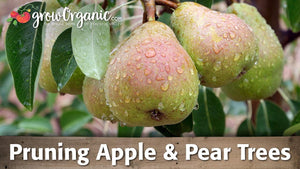Item Number: FT043
Honey Crisp Apple Tree
The crisp, sweet apple favorite.
Honeycrisp Apple Tree is one of the most celebrated modern apple varieties, adored for its explosive crispness, balanced sweetness, and refreshing juiciness. The Honeycrisp Apple (Malus domestica ‘Honeycrisp’) produces medium to large fruit with mottled red and yellow skin and remarkably crisp, coarse-grained flesh that delivers a clean, sweet-tart flavor in every bite. Its exceptional texture and long storage life make it a top choice for fresh eating, salads, cider, and baking, offering a premium apple experience straight from the tree or months after harvest.
This cold-hardy and highly productive apple tree thrives in full sun and well-drained soil, performing especially well in regions with moderate to high chill hours. Honeycrisp is not self-fruitful and requires a compatible pollinator—such as Gala, Fuji, McIntosh, or Empire—to ensure heavy cropping. Ripening in early to mid-fall, it delivers consistently high-quality apples known for maintaining their crispness long after picking. Its vigorous growth habit and strong disease resistance make it a standout for home orchards and small-scale growers seeking reliability and top-tier fruit.
In spring, the Honeycrisp Apple Tree bursts into bloom with clouds of fragrant white blossoms that attract bees and add ornamental beauty to any edible landscape. Valued for its superior flavor, exceptional crunch, and dependable performance, Honeycrisp continues to be one of the most sought-after choices for gardeners who want a premium apple tree that delivers extraordinary texture and taste.
Semi-Dwarf on M-111 rootstock.
Tree Size & Growth
Our semi dwarf Honeycrisp apple tree, , reaches a manageable height of 15–20 feet, making it ideal for smaller orchards and gardens. If you prefer compact trees, dwarf varieties are also available for limited spaces.
Growing Conditions
- Zones: USDA zones 3–9
- Chill Hours: 800–1000
- Bloom Time: Late, based on Central Valley California climate
- Cold Hardiness: Bred in Minnesota, Honeycrisp is well suited to withstand colder winters
- Sun/Shade: Requires full sun for best fruit quality
- Soil: Prefers well-drained soil, with ideal temperatures between 60–80°F
Pollination & Care
Honeycrisp is partially self-fruitful but yields best with a pollinator such as Granny Smith, Gala, Empire, McIntosh, or Red Delicious. Proper pruning, thinning, and disease management are essential for producing large, flavorful apples. Heavy thinning helps prevent overcrowding and ensures crisp, juicy fruit.
Harvest & Storage
Honeycrisp apples are typically harvested in early to mid-August. Their striped red-over-yellow skin with white flesh develops a beautiful pink cast in good light. They’re aromatic, sub-acid, and known for outstanding storage life—lasting up to five months in proper conditions.
Why Choose Honeycrisp?
- Outstanding flavor and crisp texture
- Excellent cold hardiness for northern growers
- Manageable size in semi dwarf Honeycrisp apple form
- Long storage life and versatile culinary use
For more apple tree options, browse our full collection of bare root apple trees for sale.
Visit our Fruit Tree Central for a listing of all our fruit tree videos and articles.
Visit Tree Characteristics for a listing of all our fruit & nut tree growing characteristics.
For more information about different types of rootstocks and how they influence tree size and growth, see our Tree Rootstock Characteristics Chart.


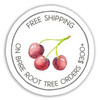
Check Your Zone Compatibility:
Compatible with your zone.
Growing Zone for

Our Guarantee To You
Since 1976, we've served our customers at every stage of growing. Please contact us at any time. We are happy to support and assist you.
Shipping Information
Shipping Information
Cannot ship to the following states: HI, AK, PR, GU, VI
Shipping Weight: 5.0 lb
Dimensions: 47.5"L x 7.3"W x 2.75"H
Features
Features
- Bare Root
- Flavor Pick
- Good Keeper
- Suited to Cold Climates
Characteristics
Characteristics
Planting & Care
Planting & Care
Useful Information
Useful Information
Guarantee
Guarantee
Limited Dormant Tree & Plant Guarantee
* Claim deadline is June 15th
We guarantee that your dormant tree or plant will arrive in good, viable condition. If your tree arrives in substandard condition, notify us within 3 days of delivery. Please email pictures of the box, inside packaging, the tree and its roots to helpdesk@groworganic.com. We will investigate your claim and process a request to exchange or refund the damaged product.
If your dormant tree or plant has not grown new leaves by June 15th, you may be eligible for our Limited Dormant Tree & Plant Guarantee. This guarantee provides for a store credit for the purchase price of the tree, excluding shipping. Please see the Instructions below.
Important Dates:
- April 1st Dormant trees/plants must be planted in the ground
- May 15th Perform scratch test, if no new leaves have grown
- June 15th Deadline to apply for a dormant tree/plant credit
All required documentation must be received by June 15th for your claim to be considered. Claims or documentation received after June 15th will be denied, without exception. Instructions listed below
Terms and Conditions
We cannot guarantee that your tree or plant will remain alive and healthy after it is received, or bear fruit as there are too many variables in your environment that are beyond our control (i.e. soil preparation, weed and pest control, proper irrigation, chill hours, compatible hardiness for your growing zone, proper choice of pollinator, extreme weather, rodent damage, disease, etc.).
We cannot guarantee that we will be able to provide a replacement tree/plant of the same species either that same growing season or in future years. Customers are responsible for all shipping fees associated with replacement trees and plants.
If we determine that the tree you purchased directly from us is not viable, we will issue you a store credit (not a refund) for the purchase price of the affected dormant tree or plant. Shipping is not included in the dormant tree/plant guarantee. Store credits can be used to purchase any product we sell and are valid for use only until July 1st of the following year.
Historically, 98% of our dormant trees and plants grow and thrive when they have been cared for and planted using our growing guides. Dormant trees and plants must be planted in the ground by April 1st in order to be eligible for credit. If the ground in your area is still frozen solid, you may temporarily plant your tree or plant in a pot.
Potted, non-dormant trees or plants are excluded from this guarantee as they are not dormant at the time of shipment. Evergreen trees such as citrus, avocado and olive trees are not available for credit under the Dormant Tree and Plant Guarantee.
Instructions
We guarantee that your dormant fruit tree or plant will leaf out, if you care for it according to our growing guides. In the unlikely event that your dormant tree or plant does not have leaves by May 15th, follow these simple steps to apply for a store credit:
Before you call or email, please perform a “scratch test” to determine if the tree or plant is still alive. This video shows how to check for live tissue under the bark. Scratch tests need to be done a few inches above and below the graft.
Green Cambium Layer / Living Trees
If the cambium layer under the bark is green, give your tree a little more time. It is still alive, but hasn’t come out of dormancy yet. Check to make sure that it is getting the right amount of deep root water, enough sunlight and that the weather is warm enough for that type of tree/plant to come out of dormancy. Every tree has its own personality and will come out of dormancy at different times. Be sure to submit the required documentation listed below by June 15th, if it doesn’t grow leaves.
Brown Cambium Layer / Dead Trees
If the scratch test shows a brown cambium layer or if your dormant tree/plant doesn’t have leaves by June 1st, please email us at helpdesk@groworganic.com. All required documentation listed below must be received by June 15th for your claim to be considered. To be considered for the guarantee claim, all required documentation must be received by June 15th. Incomplete submissions will be denied.
Required Documentation
- Order number
- Name of dormant tree/plant and the quantity affected
- Photos of each tree or plant showing:
- The roots (tree or plant must be pulled out of the ground)
- The scratch test areas
- The entire tree/plant
We reserve the right to not issue credit for items that have already been replaced. We also reserve the right to require photographic evidence that the tree/plant was not killed by root rot, rodent or mechanical damage.
Share


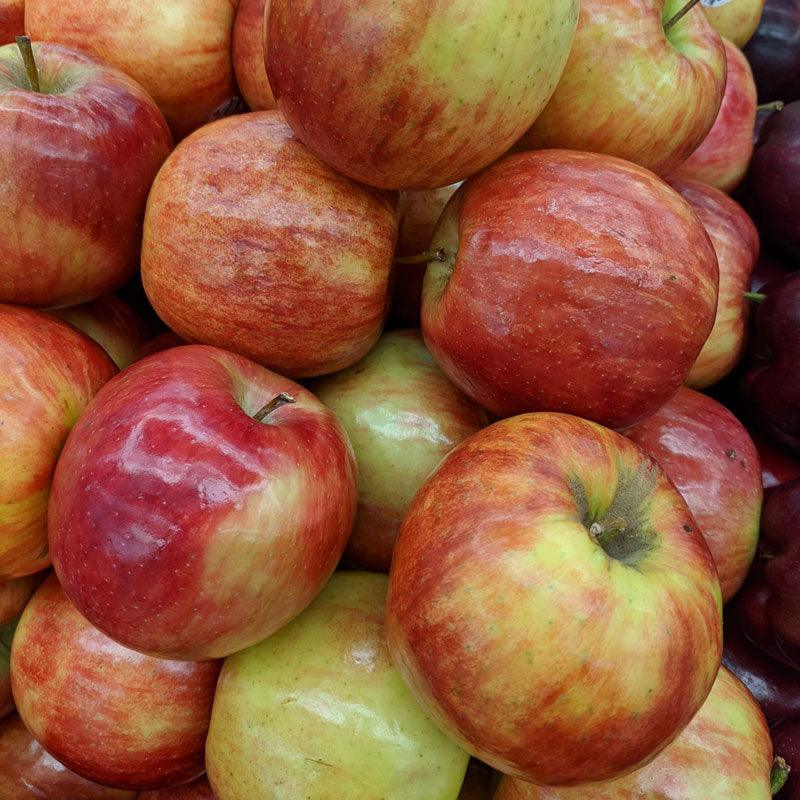
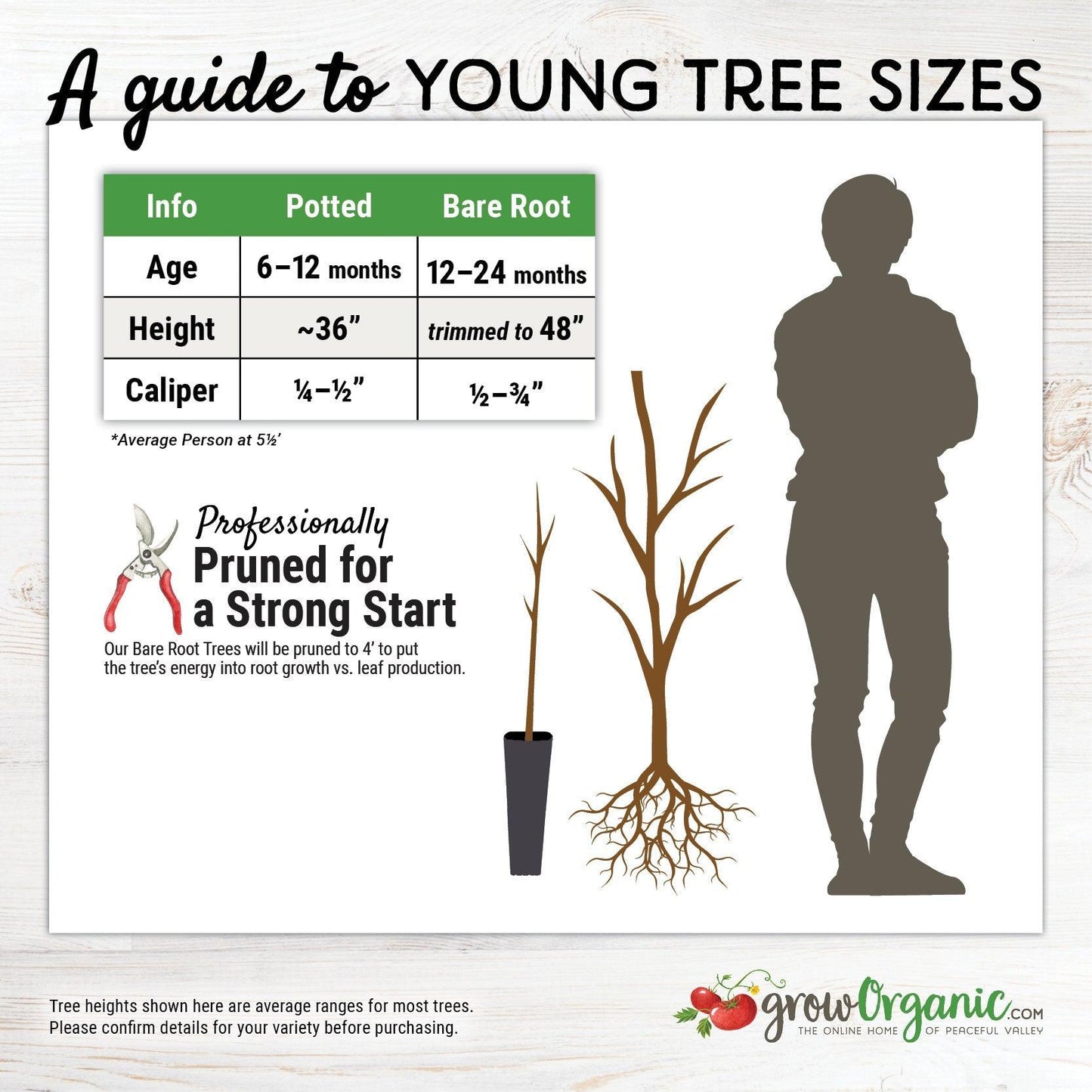
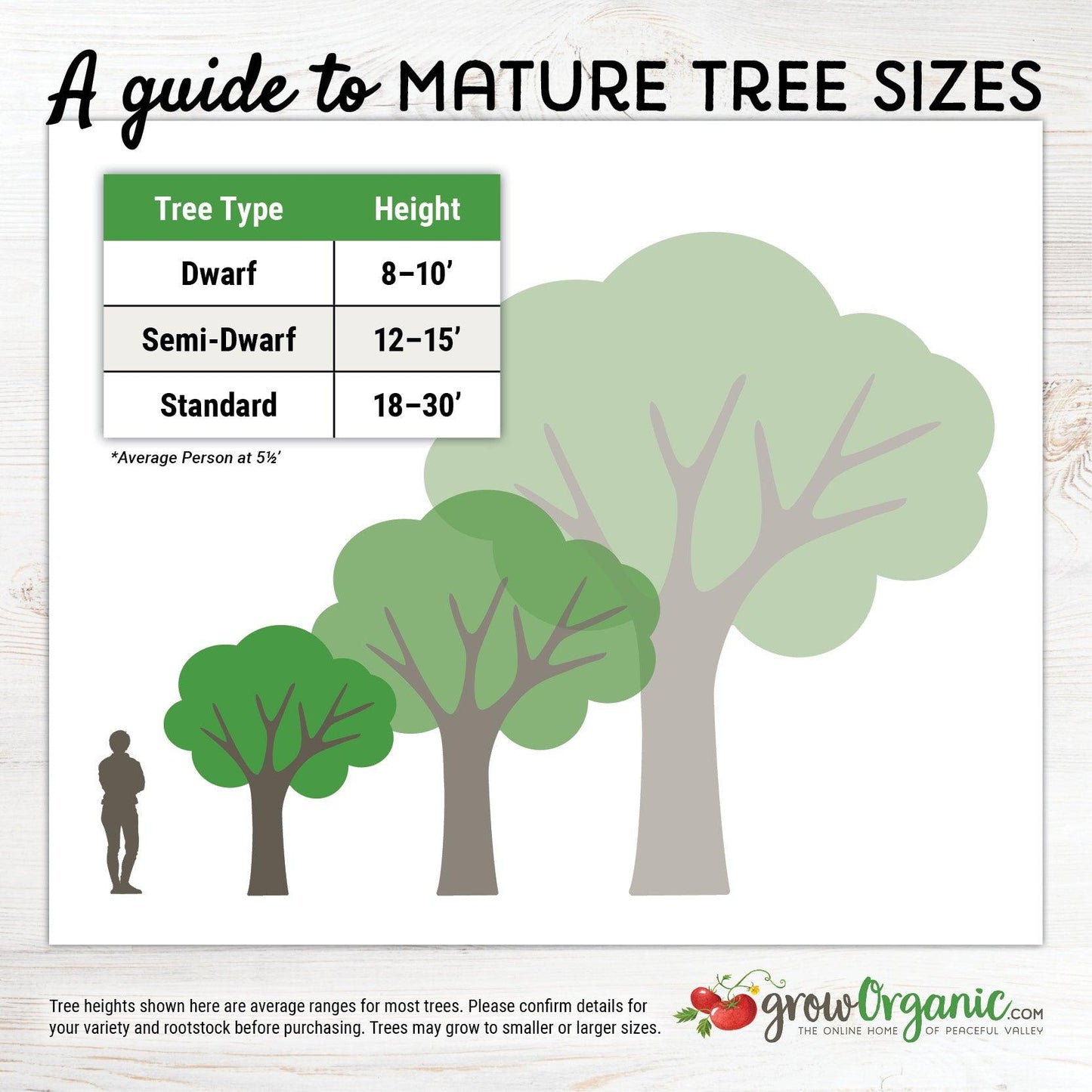
Best place to buy fruit trees, seeds and more. Thank you!
good quality
The tree arrived healthy, and in good condition--lots of moist healthy roots. I can't wait to see it grow!
Tree was delivered in a sturdy box with well wrapped roots packed in damp woodchips. Tree trunk was smaller than cherry trees n same order, but still decent size with a good root system. Planted day received.
little smaller than the other trees in my purchase, but budding and looking great







